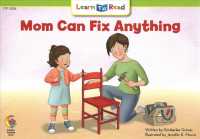- ホーム
- > 洋書
- > 英文書
- > History / World
Full Description
The Nazi regime and local collaborators killed 800,000 Belorussian Jews, many of them parents or relatives of young Jews who survived the war. Thousands of young girls and boys were thus orphaned and struggled for survival on their own. This book is the first systematic account of young Soviet Jews' lives under conditions of Nazi occupation and genocide.
These orphans' experiences and memories are rooted in the 1930s, when Soviet policies promoted and sometimes actually created interethnic solidarity and social equality. This experience of interethnic solidarity provided a powerful framework for the ways in which young Jews survived and, several decades after the war, represented their experience of violence and displacement.
Through oral histories with several survivors, video testimonies, and memoirs, Anika Walke reveals the crucial roles of age and gender in the ways young Jews survived and remembered the Nazi genocide, and shows how shared experiences of trauma facilitated community building within and beyond national groups.
Pioneers and Partisans uncovers the repeated transformations of identity that Soviet Jewish children and adolescents experienced, from Soviet citizens in the prewar years, to a target of genocidal violence during the war, to a barely accepted national minority in the postwar Soviet Union.
Contents
Preface
Acknowledgments
Note on Transliteration and Geopolitical Terminology
Maps
Introduction
1. On Methodology: Oral History and the Nazi Genocide
2. Between Tradition and Transformation: Soviet Jews in the 1930s
3. The End of Childhood: Young Soviet Jews in the Minsk Ghetto
4: Suffering and Survival: The Destruction of Jewish Communities in Eastern Belorussia
5. Fighting for Life and Victory: Refugees from the Ghettos and the Soviet Partisan Movement
6. Of Refuge and Resistance: Labor for Survival in the "Zorin Family Unit"
Conclusion: Soviet Internationalism, Judaism, and the Nazi Genocide in Oral Histories
Notes
Sources
Index








